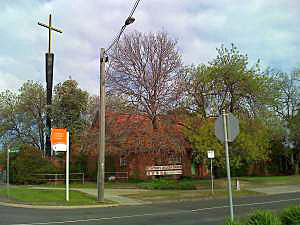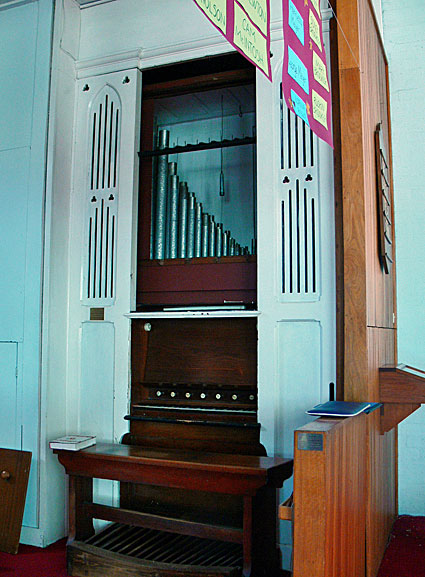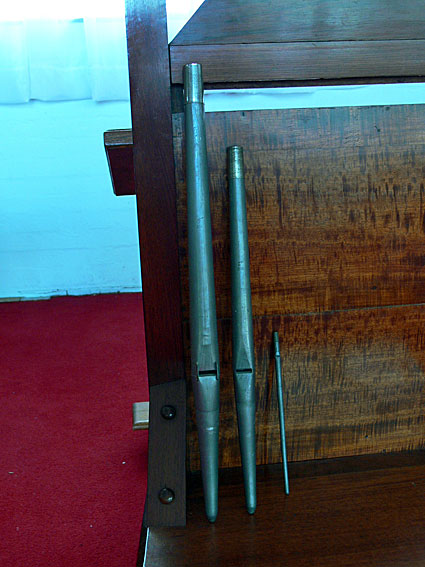
St Matthew's Anglican Church, Ashburton: church exterior
[image from http://stmatthews1.wordpress.com/about/)]

St Matthew's Anglican Church, Ashburton: church exterior
[image from http://stmatthews1.wordpress.com/about/)]
Historical and Technical Documentation by John Maidment
© OHTA (last updated October 2014)
The first church building was dedicated on 21 September 1947.1 The foundation stone of a mission hall, that served both as a church and hall, was laid on 31 January 1954 and completed later in that year.2 In 1961, when a separate hall was erected, this was used exclusively as a church.3

St Matthew's Anglican Church, Ashburton: the organ case
[photograph by John Maidment (11 November 2006)]
The organ was built in 1869 by George Fincham for Henry Kemmis, a schoolmaster based at Warrnambool, in Victoria's Western District. Kemmis moved to Bathurst, NSW in 1874 and the organ was returned to the Fincham factory. It was lent to George Peake in 1875 when Fincham was building an organ for him and sold in 1876 to St Barnabas' Anglican Church, Balwyn.4
The organ was installed at Ashburton around 1960 when it was replaced at Balwyn by a larger instrument. It is understood that Harry Marriner was responsible for this work, the total cost of which was £650.5 At this time, modifications were made to the casework when the organ was accommodated within a small alcove.

St Matthew's Anglican Church, Ashburton: console
[photograph by John Maidment (11 November 2006)]
In 1970, Laurie Pipe Organs substituted a Fifteenth 2 for the original Keraulophon. The Fifteenth incorporated 28 conical pipes of the Choir Cone Gamba made for the 1877 Hill & Son organ at Adelaide Town Hall. The Laurie firm carried out renovation work in 1976.6
This is one of the earliest Fincham organs to survive, although it has been changed through alterations to the casework, wind system, swell box and pipework. While the pipework was originally enclosed, the swell shutters have been removed and the central flat of dummy pipes removed. The original form of the central flat is unknown.7
| MANUAL Open Dia Stopd Dia Keraulophon Principal Flute Swell to Pedal PEDAL [Bourdon] |
8ft 8ft 8ft 4ft 4ft [16] |
|
Compass: 56/29
Mechanical key and stop action
Attached drawknob console
Lever swell pedal (disconnected)8
1 Holt, Margaret, Like Living Stones; a History of St Matthew's Ashburton (Ashburton: the Church, 1997), p.12
2 Ibid., pp. 24, 22
3 Ibid., p.25
4 Matthews, E.N., Colonial Organs and Organbuilders (Carlton: Melbourne University Press, 1969), pp.181, 120-121.
5 Holt, op.cit, p.31
6 Author's notes; details noted 1966, c.1972 and 2006
7 Author's observations
8 Specification noted 2006 John Maidment

St Matthew's Anglican Church, Ashburton: the organ case
[photograph by W.G.S. Smith (late 1960s)]

St Matthew's Anglican Church, Ashburton: Cone Gamba pipework ex Adelaide Town Hall
[photograph by John Maidment (11 November 2006)]